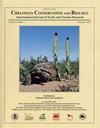圣克罗伊岛桑迪角大西洋棱皮龟的生殖生物学:前30年
IF 0.8
4区 生物学
Q3 ZOOLOGY
引用次数: 8
摘要
摘要自1981年以来,对美属维尔京群岛圣克罗伊岛Sandy Point国家野生动物保护区(SPNWR)棱皮龟的筑巢种群进行了全面研究。这里报告了该研究和保护项目前30年的筑巢和孵化数据。由于密集的巢穴迁移和保护工作,种群数量最初表现出稳步增长,最显著的增长发生在1997年至2001年之间。然而,尽管继续努力,这种复苏在2000年至2010年的十年中开始停滞。在此期间,对筑巢数据的分析,包括具体的繁殖参数,如繁殖率、再迁移间隔和生产力(筑巢数量、孵化成功率),结合历史数据,为评估这些因素对Sandy Point种群动态的贡献提供了机会。年度繁殖数据表明,无论总体筑巢数量如何,奇数年的筑巢数量始终较高(115.6 ± 18.58)甚至比几年(68.4 ± 7.63)(p < 0.01)。在研究期间,年均再迁移间隔增加,达到3.41的历史新高 ± 2008年观察到0.18年。观察到平均筑巢数量稳步下降(R2 = 0.84),创下3.60的历史新低 ± 2010年,每只海龟有2.16个巢穴。孵化成功率在30年的时间里各不相同,从40.28%的项目低点 ± 2005年为23.20%,达到67.80%的历史新高 ± 1991年为20.31%。该项目前30年的平均总孵化成功率为58.50% ± 7.75%。在项目过程中,孵化成功率下降,2000年代每只海龟孵化的数量下降。这些因素导致人口生产力下降,并可能最终抑制人口的持续增长。在研究期间,一定比例的再移民继续在Sandy Point筑巢。然而,观察到新生植物的数量和百分比下降,这表明招募延迟或减少,可能是由于年龄增加到性成熟,生命早期死亡率增加,或觅食地食物资源的变化。这些结果表明,人口增长放缓,未来可能开始下降。需要进行进一步的研究,以了解可能的母体、生理和环境因素,这些因素正在影响这些生殖参数,并最终影响SPNWR的种群动态。本文章由计算机程序翻译,如有差异,请以英文原文为准。
Reproductive Biology of Atlantic Leatherback Sea Turtles at Sandy Point, St. Croix: The First 30 Years
Abstract The nesting population of leatherback sea turtles at the Sandy Point National Wildlife Refuge (SPNWR), Sandy Point, St. Croix, US Virgin Islands, has been comprehensively studied since 1981. Nesting and hatching data are reported here for the first 30 yrs of the research and conservation project. Because of intense nest relocation and conservation efforts, the population initially showed a steady increase in numbers, with the most dramatic rise occurring between 1997 and 2001. In spite of continued efforts, however, this recovery began to stall in the decade from 2000 to 2010. Analysis of nesting data, including specific reproductive parameters such as recruitment rate, remigration interval, and productivity (number of nests laid, hatching success) during this time frame, in conjunction with historical data, provided an opportunity to assess the contribution of these factors to the population dynamics at Sandy Point. Annual reproductive data demonstrated that regardless of overall nesting numbers, odd years consistently exhibited higher nesting numbers (115.6 ± 18.58) than even years (68.4 ± 7.63) (p < 0.01). The average annual remigration interval increased over the study period with a record high of 3.41 ± 0.18 yrs observed in 2008. A steady decline in average nests laid was observed (R2 = 0.84) between 1992 and 2010, with a record low of 3.60 ± 2.16 nests per turtle in 2010. Hatching success varied over the 30-yr period from a project low of 40.28% ± 23.20% in 2005 to a record high of 67.80% ± 20.31% in 1991. Mean overall hatching success for the first 30 yrs of the project was 58.50% ± 7.75%. Hatching success declined over the course of the project, and the number of hatchlings produced per turtle declined in the 2000s. These factors contributed to a decrease in population productivity and may ultimately have inhibited continued population growth. Over the study period, a stable percentage of remigrants continued to nest at Sandy Point. However, a decreased number and percentage of neophytes was observed, suggesting either a delayed or a decreased recruitment, possibly due to increased age to sexual maturity, an increased mortality of early life stages, or a change in food resources at foraging grounds. These results suggest a population that has slowed growth and that may begin to decline in the future. Further research needs to be conducted to understand possible maternal, physiological, and environmental factors that are impacting these reproductive parameters and, ultimately, affecting the population dynamics at SPNWR.
求助全文
通过发布文献求助,成功后即可免费获取论文全文。
去求助
来源期刊
CiteScore
1.70
自引率
14.30%
发文量
17
审稿时长
>12 weeks
期刊介绍:
Chelonian Conservation and Biology is a biannual peer-reviewed journal of cosmopolitan and broad-based coverage of all aspects of conservation and biology of all chelonians, including freshwater turtles, marine turtles, and tortoises. Manuscripts may cover any aspects of turtle and tortoise research, with a preference for conservation or biology. Manuscripts dealing with conservation biology, systematic relationships, chelonian diversity, geographic distribution, natural history, ecology, reproduction, morphology and natural variation, population status, husbandry, community conservation initiatives, and human exploitation or conservation management issues are of special interest.

 求助内容:
求助内容: 应助结果提醒方式:
应助结果提醒方式:


